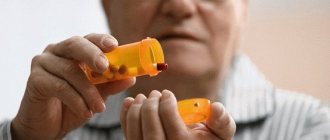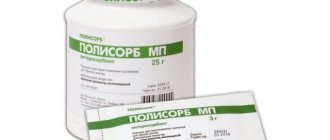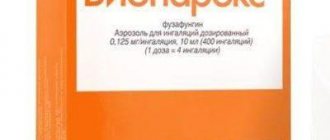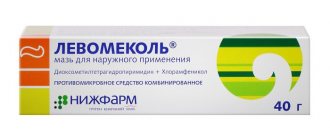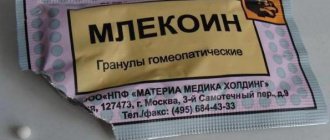Can it be used during lactation?
Many women during breastfeeding are afraid to take medications so as not to harm the baby.
When used in small quantities, Acyclovir enters the blood and breast milk, therefore the official instructions do not allow use during lactation.
The small amount of medicine that passes into breast milk does not harm the baby . Doctors prescribe this drug during lactation, but it can only be used under supervision and carefully following the doctor’s recommendations.
Indications and effect of the drug
Acyclovir is used to treat the following ailments:
- herpes infection of any type;
- HIV infection;
- chickenpox.
Eye ointment is used to treat acute inflammation of the hair follicle of the eyelash or meibomian gland. The medication is also used to treat inflammation of the cornea and other eye diseases. The drug is used to treat herpes on the lip, intimate organs and internal membranes.
The medicine in the form of tablets practically does not cause side effects, since the proportion of the active substance that enters the milk of a nursing mother is 1%. When using ointment, even less acyclovir penetrates into the body. Thus, both dosage forms are safe for infants.
As for the powder for injections, it is used only for severe forms of viral illnesses. The powder should not be used during lactation. In case of overdose, there is a risk of kidney failure.
Acyclovir is a weak but effective remedy against herpes infection. According to the instructions, the drug is prohibited for pregnant and lactating women, since its effect on the child’s body is not known. Despite this, doctors often prescribe the drug, but only after examination and identification of all possible risks.
Contraindications and side effects
Acyclovir has a number of contraindications that you need to be aware of.
The medicine is not used for:
- the occurrence of allergic reactions;
- renal failure;
- neuralgic disorders;
- individual intolerance to the active substance or components.
The drug should not be used in children under two years of age.
Acyclovir has a fairly large list of side effects:
- headaches, dizziness;
- abdominal pain, indigestion;
- various allergic reactions;
- nausea, vomiting;
- erythema, burning, peeling when applied topically.
Any side effect or deterioration in well-being must be reported to your doctor; you cannot adjust the course of treatment yourself.
Undesirable effect of the drug
When taking tablets, the following are possible:
- allergic reactions;
- nausea accompanied by vomiting;
- diarrhea;
- pain in the abdomen;
- the appearance of headaches.
When using the drug externally, you need to be prepared for the appearance of erythema, burning sensation, peeling of the skin; in case of contact with the mucous membranes of the eyes, inflammatory reactions, blepharitis, and keratitis are possible.
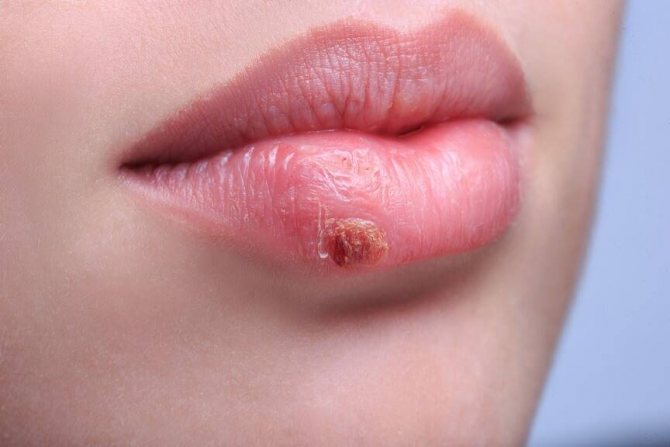
How does breastfeeding affect milk and the baby?
The dosage of the active substance in one tablet is 200 mg . According to calculations, no more than 0.3 mg can pass into breast milk. Such a small amount has no effect on the baby and will not cause any harm.
In order to minimize the possible penetration of the drug into the child’s body, it is necessary to strictly follow the doctor’s recommendations on the rules for taking the drug.
During breastfeeding, the mother's body begins to actively produce special antiviral agents - antibodies that neutralize harmful microorganisms and viruses, then the antibodies are delivered to the baby along with the milk. During lactation, the child's immunity is strengthened .
Analogs
Similar drugs are considered:
- Zovirax. According to the description, this drug is prescribed only according to indications and under the supervision of specialists. During lactation, this drug is more effective than Acyclovir. This is due to the fact that it was created later and doctors took into account the undesirable effects of Acyclovir. Thus, improving this substance. It copes well with the treatment of herpes and chickenpox not only in adults, but also in children.
- Valtrex. Prescribed only by a doctor. It copes well with lichen and genital herpes, as well as infectious diseases of the skin.
- Fenistil is also prescribed only by a doctor if indicated. This drug was not detected in the blood after topical application.
- Herpferon. It is an immunomodulator, antiviral and anti-inflammatory drug with a pronounced analgesic effect. Enters the bloodstream in small concentrations. Prescribed only by a specialist if necessary and indicated.
- Lysozyme is approved for use by nursing mothers and can be prescribed in complex therapy. Has an antibacterial, anti-inflammatory effect.
- Famvir. Has an antiviral effect. Active against viruses that cause herpes, chickenpox, and lichen. It is not known whether this drug passes into breast milk. However, experiments on laboratory animals gave a positive answer. Therefore, the drug is not suitable for self-treatment.
Any of the medications is prescribed only by a doctor. Do not put your child at risk and do not self-medicate!
When taking medications, you need to understand that the risk for the baby cannot be completely eliminated. Therefore, the best remedy is the prevention of any diseases. It is best to immediately consult a doctor when you detect the first signs of the disease. In this case, the effect of the prescribed Acyclovir will be much more effective, and the result will come faster.
Source: laktacia.ru
Recommendations for use in breastfeeding mothers
Acyclovir is eliminated from the body quite quickly. Its half-life is 3 hours. Therefore, when using tablets, you must first feed the child, and then take the medicine and maintain a three-hour interval. According to the standard treatment regimen, tablets should be taken 5 times a day in this way.
When using an ointment, the active substance almost does not penetrate the body, but it should also be applied no more than 5 times a day. In addition, it is necessary to follow preventive measures to avoid infecting the child . If inflammation appears on the face, you should avoid touching the child, kissing, etc. Wash your hands thoroughly before contacting him.
If inflammatory areas appear on the chest, they can be treated with Fukortsin or propolis tincture. After this, carefully cover or bandage the infected area to avoid infecting the child. If inflammation appears on one breast, milk should be expressed from it and the baby should be fed from the other. This will allow you to maintain lactation in full.
If the inflammatory process has spread to both breasts, feeding must be stopped . In this case, you should not use Acyclovir ointment; you need to consult a doctor to find another local antiviral drug.
In order for treatment to be more effective, it is necessary to strengthen the immune system and improve the general condition of the body. To do this, first of all, you need to eat right and get the necessary vitamin complex.
In what form can it be used: ointment, tablets
Acyclovir comes in different forms:
- pills;
- ointment for skin and mucous membranes;
- powder for the preparation of solution for injection;
- eye ointment.
Acyclovir injections are prescribed extremely rarely, only in complex cases of disease. Breastfeeding always stops with this treatment option.
Eye ointment is prescribed for the occurrence of keratitis, stye and other similar eye diseases; during breastfeeding, the ophthalmologist often selects other medications.
Tablets are prescribed during lactation, but in a strict dosage and only if necessary. Ointment is the most common form of Acyclovir . Diseases such as chickenpox and herpes manifest themselves mainly in the form of inflammatory rashes.
For nursing women, as a rule, local treatment with ointment or in combination with tablets is prescribed for more severe development of the disease.
Use during lactation
Despite the fact that Acyclovir has many side effects, they can only appear if you use tablets or ointment in large quantities. About one percent of this drug from the dose taken by a nursing mother can be concentrated in breast milk.
If herpes occurs in the area of the mammary glands, then you need to adhere to the following rules:
- the doctor should prescribe an antiviral drug that will be safer for the infant;
- The child should not be allowed to touch the virus-infected area. It needs to be bandaged tightly;
- If herpes has spread to both breasts, it is better to stop breastfeeding for the duration of treatment.
When taking Acyclovir during breastfeeding, 200 mg of the drug enters the mother's body at a time. If you take it 5 times a day, then its content in breast milk will be 0.3 mg/kg. This is a very small percentage, so a tiny fraction of the medicine can enter the newborn’s body. It is eliminated from the mother’s body in almost three hours. Therefore, doctors recommend using it immediately after feeding and maintaining such a time interval.
It is important to maintain good hygiene during treatment for herpes while breastfeeding to prevent the baby from becoming infected. If this happens, doctors may prescribe him to take Acyclovir, based on the baby’s body weight.
Analogues of "Acyclovir"
If it is impossible to use Acyclovir, it can be replaced with one of its analogues. The most popular drugs are:
- "Famvir." It is characterized by an antiviral effect and is active against lichen, chickenpox, and herpes.
- "Lysozyme". Allowed for use during the lactation period. Has anti-inflammatory, antibacterial effect.
- "Gerpferon". It is an immunomodulator.
- "Zovirax". It is considered a more effective drug for the treatment of herpes during the lactation period.
- "Fenistil". Can only be used as prescribed by a doctor. After using the local remedy, the active components are not detected in the blood and breast milk.
- "Valtrex". Effectively eliminates infectious lesions of the dermis, genital herpes, and lichen.
It is important to consider that all of these drugs have certain contraindications and can provoke specific negative symptoms.

View gallery
Features of the use of Acyclovir during breastfeeding
In no case should you ignore the appearance of herpes, because the advanced form of the disease is fraught with the most serious consequences. It should be remembered that Acyclovir is only part of the complex treatment of herpes.
When the first symptoms of the disease appear, the mother, first of all, must adhere to certain rules in order to avoid infecting the child, and this means that she will have to refrain from kissing the baby and “unjustified” bodily contact with him. If you do not have the opportunity to immediately apply Acyclovir (cream or ointment), then the appearance of blisters on the body can be prevented by treating the site of the rash with propolis (or calendula) tincture or Fukortsin.
Apply ointment or cream to the area of skin affected by herpes no more than 5 times a day, covering it with a bandage after treatment to prevent any contact with the child. If herpes appears on the breast, you will have to feed only the healthy breast for the duration of treatment, and express the affected breast so that milk stagnation does not form. If both mammary glands are affected, you will have to stop breastfeeding for the duration of treatment, without forgetting to express milk, so that after recovery you can return to breastfeeding your baby. If you are not ready to give up breastfeeding even temporarily, then it is better to consult a doctor - he will select a more suitable antiviral agent.
If for some reason you were unable to buy Acyclovir ointment or cream at the pharmacy, then as a last resort (or in case of complications), mommy can be treated with tablets, but you must strictly adhere to the dosage and intervals between feedings!
With a single dose of a tablet, approximately 200 mg of acyclovir enters the body of a nursing woman. There can be no more than 5 such doses per day. Moreover, the concentration of the drug in milk, even with a daily dose, is not so high that it could harm the baby. The components of the drug are eliminated in less than 3 hours, so it is recommended to take the tablet immediately before feeding (it will not yet have time to be absorbed by the mother’s body and enter the milk) and maintain a 3-hour interval between feedings. At the same time, you must be prepared for the fact that when taking Acyclovir orally, side effects may occur - loss of appetite, nausea (vomiting), pain in the abdomen and/or stomach, unusual fatigue or weakness, increased thirst, decreased frequency of urination or volume of urine.
If infection of the child could not be avoided, then doctors in such cases also prescribe Acyclovir and the dosage of the drug in this case depends on the weight of the baby (usually the daily dosage is set at the rate of 30 mg per 1 kg of the child’s weight).
The sooner you start treatment for herpes, the faster you will overcome the disease.
Be healthy!
Source: mirmam.info

